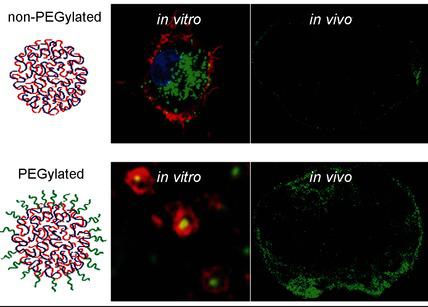当前位置:
X-MOL 学术
›
Angew. Chem. Int. Ed.
›
论文详情
Our official English website, www.x-mol.net, welcomes your
feedback! (Note: you will need to create a separate account there.)
Engineering Polymer Hydrogel Nanoparticles for Lymph Node‐Targeted Delivery
Angewandte Chemie International Edition ( IF 16.1 ) Pub Date : 2015-12-15 , DOI: 10.1002/anie.201508626 Stefaan De Koker 1, 2 , Jiwei Cui 3 , Nane Vanparijs 1 , Lorenzo Albertazzi 4, 5 , Johan Grooten 2 , Frank Caruso 3 , Bruno G. De Geest 1
Angewandte Chemie International Edition ( IF 16.1 ) Pub Date : 2015-12-15 , DOI: 10.1002/anie.201508626 Stefaan De Koker 1, 2 , Jiwei Cui 3 , Nane Vanparijs 1 , Lorenzo Albertazzi 4, 5 , Johan Grooten 2 , Frank Caruso 3 , Bruno G. De Geest 1
Affiliation

|
The induction of antigen‐specific adaptive immunity exclusively occurs in lymphoid organs. As a consequence, the efficacy by which vaccines reach these tissues strongly affects the efficacy of the vaccine. Here, we report the design of polymer hydrogel nanoparticles that efficiently target multiple immune cell subsets in the draining lymph nodes. Nanoparticles are fabricated by infiltrating mesoporous silica particles (ca. 200 nm) with poly(methacrylic acid) followed by disulfide‐based crosslinking and template removal. PEGylation of these nanoparticles does not affect their cellular association in vitro, but dramatically improves their lymphatic drainage in vivo. The functional relevance of these observations is further illustrated by the increased priming of antigen‐specific T cells. Our findings highlight the potential of engineered hydrogel nanoparticles for the lymphatic delivery of antigens and immune‐modulating compounds.
中文翻译:

用于淋巴结靶向递送的工程聚合物水凝胶纳米颗粒
抗原特异性适应性免疫的诱导仅发生在淋巴器官中。结果,疫苗到达这些组织的功效强烈影响疫苗的功效。在这里,我们报告聚合物水凝胶纳米粒子的设计,可以有效地靶向引流淋巴结中的多个免疫细胞亚群。纳米粒子的制备方法是,将中孔二氧化硅粒子(约200 nm)浸入聚(甲基丙烯酸)中,然后进行基于二硫键的交联和模板去除。这些纳米颗粒的聚乙二醇化作用不会在体外影响其细胞缔合,但会显着改善其体内的淋巴引流。抗原特异性T细胞的启动性增强进一步说明了这些观察结果的功能相关性。
更新日期:2015-12-15
中文翻译:

用于淋巴结靶向递送的工程聚合物水凝胶纳米颗粒
抗原特异性适应性免疫的诱导仅发生在淋巴器官中。结果,疫苗到达这些组织的功效强烈影响疫苗的功效。在这里,我们报告聚合物水凝胶纳米粒子的设计,可以有效地靶向引流淋巴结中的多个免疫细胞亚群。纳米粒子的制备方法是,将中孔二氧化硅粒子(约200 nm)浸入聚(甲基丙烯酸)中,然后进行基于二硫键的交联和模板去除。这些纳米颗粒的聚乙二醇化作用不会在体外影响其细胞缔合,但会显着改善其体内的淋巴引流。抗原特异性T细胞的启动性增强进一步说明了这些观察结果的功能相关性。





























 京公网安备 11010802027423号
京公网安备 11010802027423号